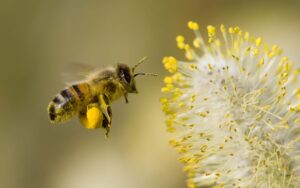Differentiating endangered honeybees from other bees
By Kathryn Menue
Editor
CHERRY VALLEY – Bzzzzzzzzzzzzzz: a sound of annoyance, a sound of warning, or a sound of coexistence. Some people see bees as a nuisance, some see them as little predators, and others see them for what they are: a means of life.
“If the bee disappeared off the surface of the globe, then man would have only four years of life left. No more bees, no more pollination, no more plants, no more animals, no more man,” Albert Einstein said.
Unfortunately, the honeybees Einstein spoke of are in a declining state in this day and age which affects the whole ecosystem.
One local of Cherry Valley, and amateur beekeeper, Gene Bolek, does what he can to help prolong and preserve the existence of bees right at home in Boone County.
Bolek said that being an amateur beekeeper means that he doesn’t salvage any of the honey bees produce like beekeepers do. He wants to preserve the bee population and if a beekeeper cultivates too much of the honey honeybees store for winter, they could die in the winter months due to lack of sustenance.
Instead, Bolek will work with locals with honeybee problems and remove the honeybees from their premises and reestablish their colony somewhere else.
Bolek said that honeybees live in swarms and follow one queen. When another queen is born, the newborn worker bees will follow her to establish their own hive to do work collecting pollen to produce honey so they can survive throughout the year. Up to three to four thousand bees can make up a swarm.
Despite the high numbers, the honeybees are still becoming endangered due to many different factors.
“Bee populations worldwide are declining due to the loss of habitat. With expanding cities and shrinking natural areas, there are fewer places for bees to thrive. An increase in the use of chemicals, such as insecticides and fertilizers, on crops, is also having an effect on bees.
They are affected by these chemicals when it is absorbed by the plant and its nectar and pollen are collected by the bees. The chemicals attack the bees’ nervous system, usually resulting in death,” onegreenplanet.org reported.
Bolek said that bees are also being affected by Colony Collapse Disorder (CCD), where bees’ immune systems are being penetrated and killing off the species to the bafflement of scientists.
He said that scientists are still looking into the disorder by exposing bees to farms with different chemicals to see if one specific or multiple chemicals are affecting the bee populations, but no firm results from these studies have been reported.
Nevertheless, Bolek has made saving the bee populations one of his primary goals in life.
The Boone County Extension Office refers Boone County citizens with honeybee problems to Bolek to help them remove the bees from their land.
However, Bolek said that he has to make sure that the bee problems these people have are honeybees and not some other type of bee that need to be exterminated by professionals, such as yellow jackets and wasps.
“Yellow jackets sting you as many times as you let them and wasps can sting you as many times as they get a hold of you,” Bolek said.
Whereas, “honeybees sting you and die. The barb they sting you with is attached to a venom sack that falls out into whoever they sting and continues to release the venom,” he said.
Once they lose the stinger with the venom sack, honeybees die, which make them less threatening than some of the other bees. Although, people are still left with a nasty sting, and need to make sure they remove the stinger from their skin, the honeybees are more useful than they are threatening.
Actually, honeybees are one of the most helpful resources in life.
In an article by onegreenplanet.org, entitled: New Research Shows Why Bees Matter So Much To Humans, researchers found, “When bees collect nectar from the flower, some of the pollen sticks to the tiny hairs on their body. This is then transferred to the next flower they visit by being rubbed off onto the stigma, the middle part of the flower, allowing the plant to produce fruit containing seeds. About 80 percent of flower plants depend on” this type of pollination.
With bees dying from chemicals, fertilizers, and CCD, honeybees are becoming endangered, which could eventually throw off the ecosystem, and lead to the end of Earth like Einstein predicted.
Bolek is aware of this decline in bees and wants to prevent it as much as possible, which is why when people call him to remove a swarm of honeybees from their yards, Bolek reestablishes their colony by taking the queen bee with the hive and relocating it, often to his own yard.
He said that he takes them to his garden because “honeybees are specifically” designed for the “job of pollinating” and because of this, Bolek’s “garden produces like crazy.”
He joked that his neighbors love it because they reap the rewards of the bees hard work because they pollinate his garden so much that they produce more than Bolek can consume on his own.
Bolek believes that his mission shouldn’t stop with him; others can also help preserve the honeybee population.
According to an article from honeycolony.com, everyone can pitch in to help preserve the existence of the honeybees in a few easy steps.
One way is to plant “bee-friendly plants” in the garden. These include: lavender, rosemary, sage, coneflower, sunflower, redbud, catnip, penstemon, lamb’s ear, verbena, bells or phacelia, aster, black-eyed Susan, oregano, and many more.
Other ways to help the population is to support “organic farmers who do not use chemicals on their crops,” and spread “the word about the importance of bees and their declining population.”
To find out more about the bee population, check out the Bumblebee Conservation Trust online, which will explain about bees and how to identify different types of bees.



